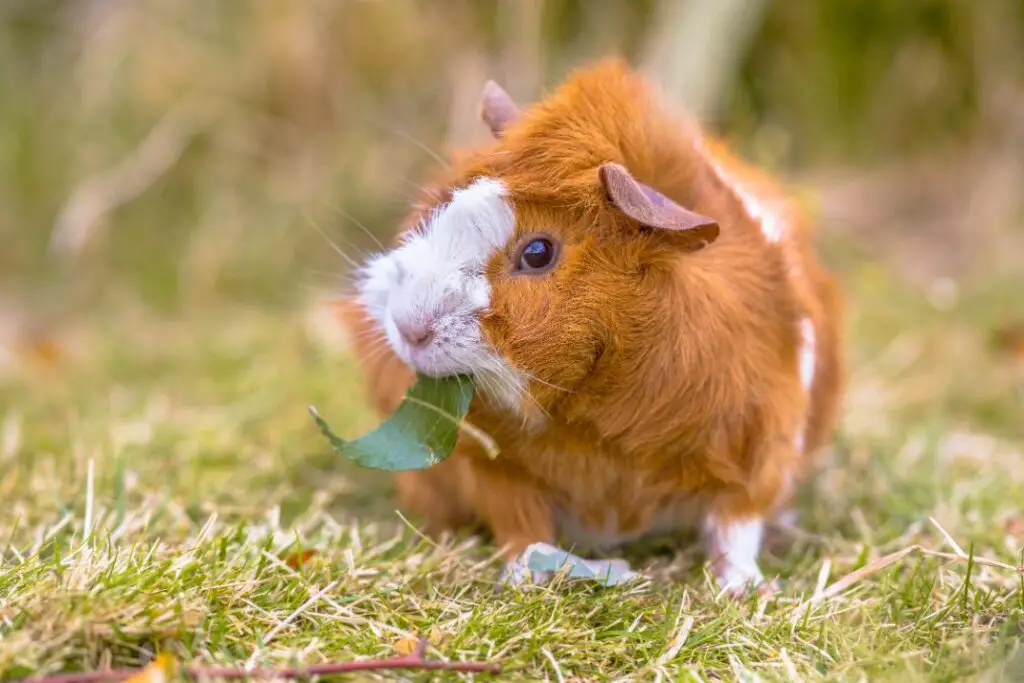Guinea pigs are adorable pets that can bring a lot of joy to our lives. They are herbivores and have a unique diet compared to other pets. A question that often gets asked by new guinea pig owners is if guinea pigs know when to stop eating.
In this blog post, we will explore the eating habits of guinea pigs and answer this question.

What Do Guinea Pigs Eat?
Understanding the Basic Diet of Guinea Pigs
Guinea pigs are herbivores, which means they eat plant-based foods. They require a diet that is high in fiber and Vitamin C. Hay is the most important part of a guinea pig’s diet, as it provides the necessary fiber.
Timothy hay is the most common type of hay used for guinea pigs, but they can also eat orchard grass, oat hay, or meadow hay.
The Role of Hay, Pellets, and Fresh Vegetables in a Guinea Pig’s Diet
In addition to hay, guinea pigs also need pellets to provide essential vitamins and minerals. It is important to choose high-quality pellets that are specifically formulated for guinea pigs.
Fresh vegetables are also an important part of a guinea pig’s diet, as they provide additional nutrients and Vitamin C. Some good vegetables for guinea pigs include kale, spinach, romaine lettuce, bell peppers, and carrots.
How Much Should a Guinea Pig Eat?
The amount of food a guinea pig needs depends on their age, weight, and activity level. As a general rule, they should have unlimited access to hay, a quarter cup of pellets per day, and a cup of fresh vegetables per day. It is important to monitor their weight and adjust their diet accordingly.
Do Guinea Pigs Overeat?
The Dangers of Overfeeding Guinea Pigs
Guinea pigs can overeat, and it can lead to health problems. Overfeeding can cause obesity, dental problems, and digestive issues. It can also lead to a lack of appetite for hay, which is necessary for their digestive health.
How to Recognize Overeating in Guinea Pigs
Signs of overfeeding in guinea pigs include obesity, decreased activity, and a lack of appetite for hay. Their stools may also be softer and smellier than usual.
If you suspect that your guinea pig is overeating, it is important to consult with your veterinarian.
Tips to Help Guinea Pigs Stop Overeating
To help prevent overeating, it is important to provide your guinea pig with a balanced diet and monitor their weight.
You can also provide them with toys and activities to keep them active and engaged. It is important to limit their intake of treats and avoid feeding them foods that are high in sugar or fat.
Can Guinea Pigs Regulate Their Own Food Intake?
Do Guinea Pigs Have an Innate Ability to Self-Regulate Their Food Intake?
Guinea pigs do have an innate ability to self-regulate their food intake.
They will typically stop eating when they are full and will not overeat if provided with a balanced diet. However, it is important to monitor their weight and adjust their diet accordingly.
Factors That Affect a Guinea Pig’s Appetite and Eating Habits
Several factors can affect a guinea pig’s appetite and eating habits, including their age, weight, and activity level.
Stress, illness, and changes in their environment can also affect their appetite. It is important to monitor their eating habits and consult with your veterinarian if you notice any changes.
How to Help Guinea Pigs Maintain a Healthy Diet and Prevent Overeating
To help your guinea pig maintain a healthy diet and prevent overeating, it is important to provide them with a balanced diet, monitor their weight, and limit their intake of treats.
You can also provide them with toys and activities to keep them active and engaged.
Conclusion
In conclusion, guinea pigs do have an innate ability to self-regulate their food intake and will not eat themselves to death. However, it is important to provide them with a balanced diet, monitor their weight, and limit their intake of treats to help prevent overeating.
As a responsible pet owner, it is important to provide your guinea pig with the best possible care to ensure their health and happiness.
- How Long Do American Eskimo Dogs Live? Important Factors and Care Tips - September 29, 2023
- Do American Bulldogs Need Grooming? Essential Tips and Care Guidelines - September 29, 2023
- Do Bengal Cats Enjoy Playing? Essential Tips for Keeping Them Active - September 29, 2023